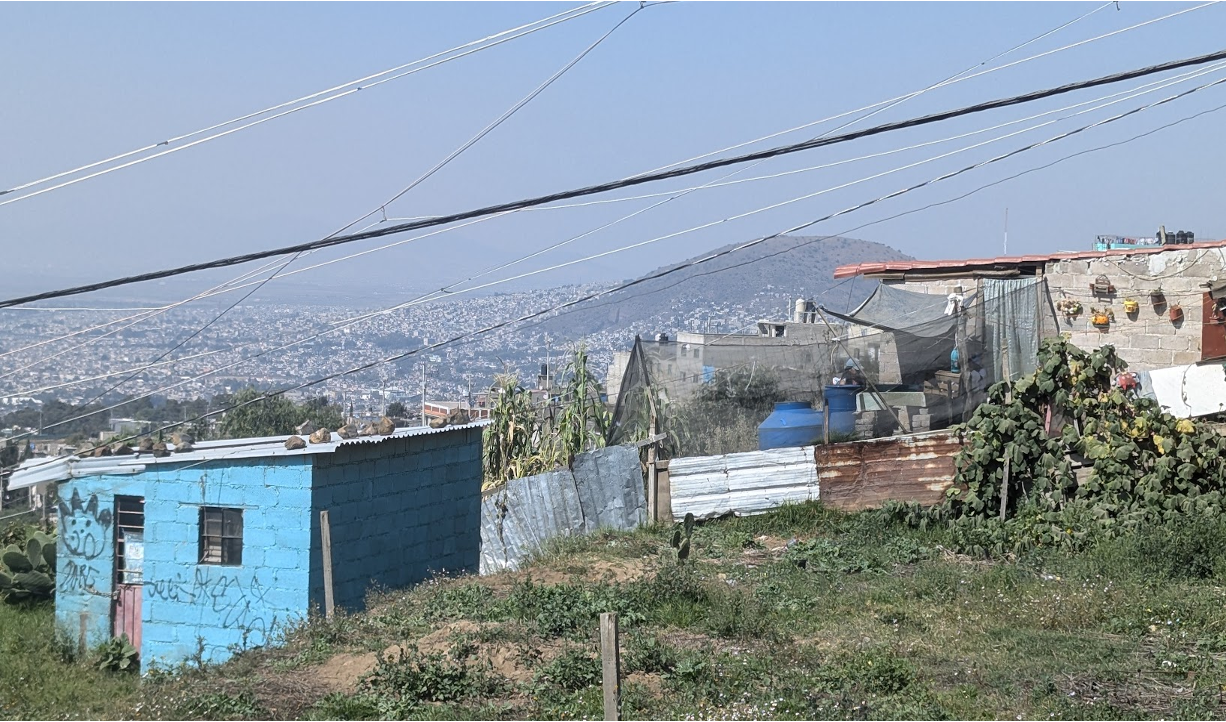Introduction: The Good News of the Kingdom
In Matthew 4:23 we read, “Jesus went throughout Galilee, teaching in their synagogues, preaching the Good News of the Kingdom, and healing every disease and sickness among the people.” After reading this verse, it caused me to reflect on a term that I had not noticed before. What does it mean that Jesus preached the ‘Good News of the Kingdom’, and how does this differ from our common Evangelical perspective of preaching the “good news”, where the gospel is often narrowly understood as the message of personal salvation.
Then I read Matthew 6:9-10 where Jesus is teaching his disciples to pray and it says, “Our Father in heaven, hallowed be your name, your kingdom come, your will be done, on earth as it is in heaven.” Here again, the theme of the Kingdom is at the heart of Jesus’ message, indicating a vision that encompasses not just a future hope but an active, present reality.
Throughout Scripture, God reveals characteristics of what Kingdom ministry looks like, but nowhere as clearly as in the life, ministry and teaching of Jesus of Nazareth. These two verses highlight that Jesus’ mission on earth was fundamentally about the Kingdom of God. It’s powerful and instructive to think that like Jesus, we are called to live as agents of this Kingdom in our cities, neighborhoods, and communities, embodying its values in everyday life and working to bring God’s reign into every sphere of life—social, economic, ecological and spiritual, particularly in places of struggle and suffering.
In the following sections, I will flesh out a framework for Kingdom ministry that biblically rooted and effective and that I believe can help Christians to pursue redemptive, transformative change in their communities.
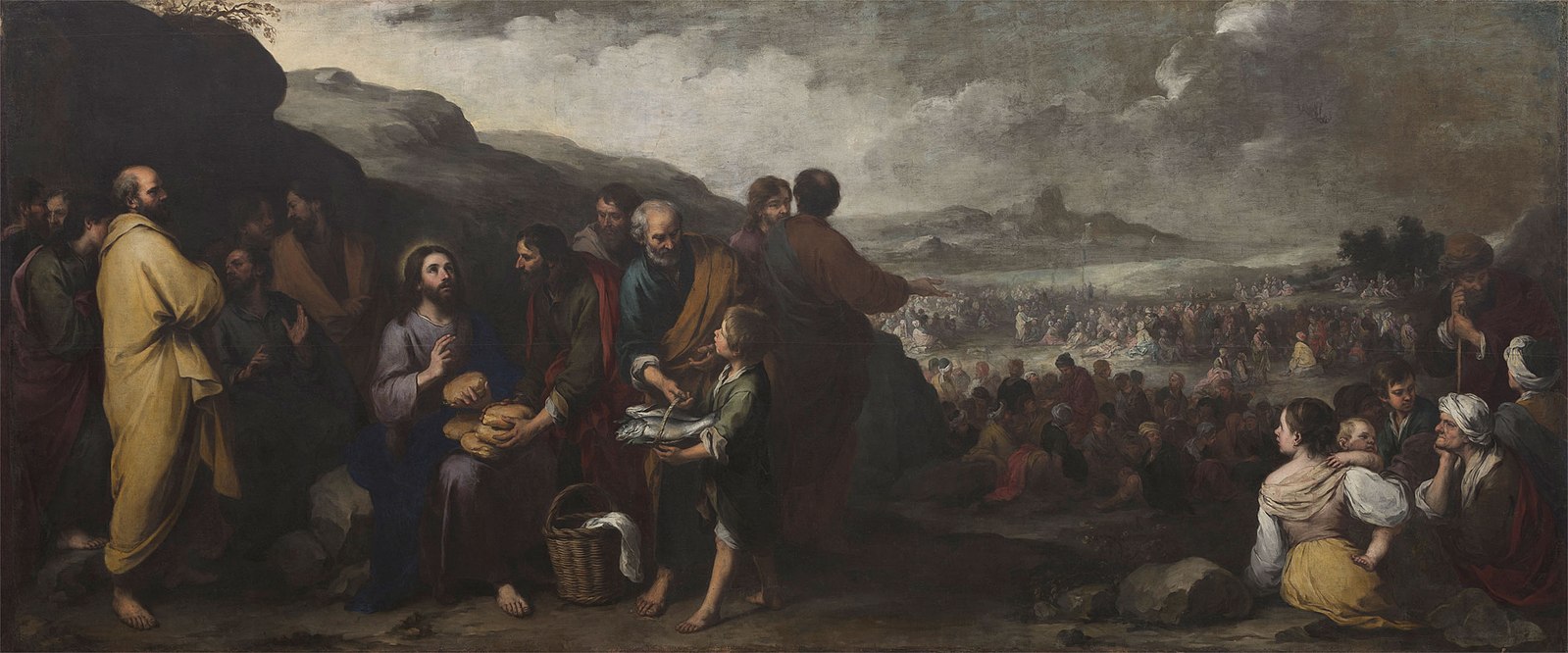
Incarnation: Bringing the Kingdom Close
John 1:14 says, “So the Word became human and made his home among us. He was full of unfailing love and faithfulness. And we have seen his glory, the glory of the Father’s one and only Son” (NLT).
At the heart of God’s redemptive story is this amazing truth we just read in the Gospel of John, that in Christ, God enters our human reality, ‘en carne’ or in the flesh to rescue and restore all of creation. I love the Message Bible translation that says, ‘The Word became flesh and blood and moved into the neighborhood.’ A careful reading of the Scripture, makes it very clear that the kind of neighborhood Jesus moved into was not place of wealth or power, but a marginalized community in Galilee, a place many considered the “wrong side of the tracks.” The question was often raised: ‘Yes, but can anything good come from Nazareth or Galilee?’ In many ways, Jesus’ choice echoes the situation of the urban poor and marginalized communities throughout Latin America and in disregarded rural and urban neighborhoods in the United States—areas often characterized by violence, poverty, and social exclusion.
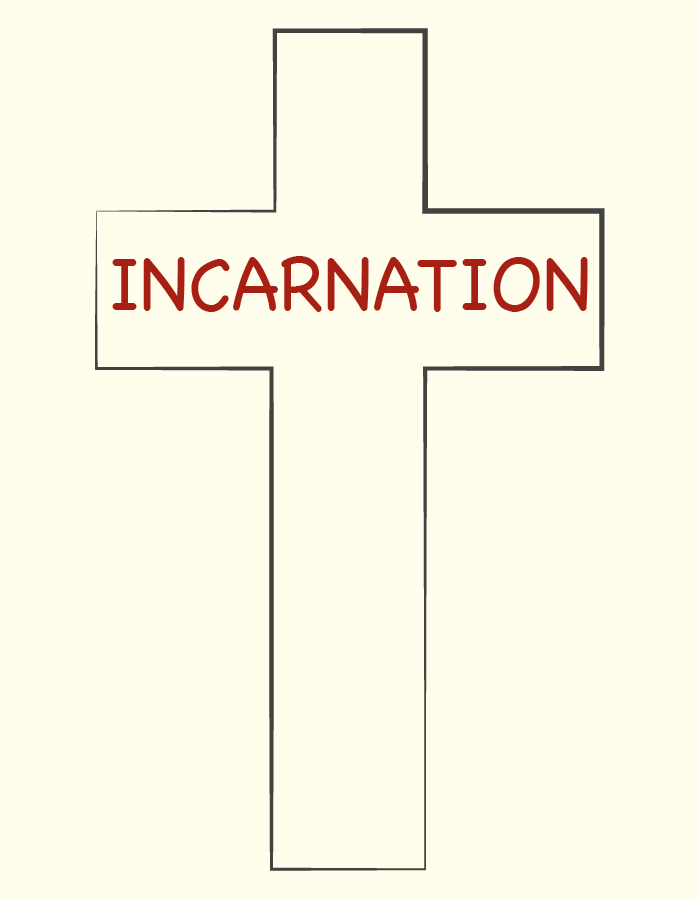
Effective ministry must be incarnational, rooted in real human contexts. This approach—living among and learning from those we serve—makes the Kingdom of God tangible.
It’s noteworthy, that in the incarnation, Christ not only entered human experience in general but also entered a social and political reality that is rooted in life at the margins, dwelling among the poor and far from centers of religious and political influence. Jesus chose to begin his ministry in Galilee—a region often dismissed as a “circle of sinners” due to its mix of Gentile cultures, diverse languages, and religious beliefs, which many Jews felt threatened the purity of their faith. It was from this “mestizo” reality, that Jesus launched his mission to the entire world, accompanied by a rag-tag team of Galilean men and women committed to Him and His cause.
Jesus’ choice to enter this specific context emphasizes that effective ministry must be incarnational, rooted in real human contexts. This approach to ministry—living among and learning from those we serve—embodies the Kingdom of God in tangible ways. As we consider God’s method of engaging the world, it’s clear that incarnation is not only essential but the linchpin for effective Kingdom ministry in all contexts,
Jesus’ ministry, therefore, shows that effective Kingdom ministry must be incarnational. For Christians called to minister in Latin America’s urban centers or rural areas, this means entering into the lives and struggles of the communities we serve. This approach to ministry is essential for any context but especially among the vulnerable and overlooked. Living among the people, building trust, and understanding the daily realities of those facing poverty, violence, and displacement, learning from them and embodying God’s love are crucial steps. This incarnational presence transforms ministry from being a “project” into a shared journey of faith and hope. Let’s delve a little deeper into this incarnational approach to ministry:
Proximity
When we consider the ministry of incarnation, one of the most important concepts is proximity. God drew close to our suffering and sin by coming to us in the flesh so we might know His love in an immediate and personal way. Can you imagine if God had taken a safer and less costly approach to bringing about salvation? Yet, by entering directly into our reality in the flesh, God made it clear that proximity and being close to us was at the center of his redemptive plan.
Reflecting on the example of Jesus’ incarnation who willingly chose to live in places, where oppression and hardship were deeply felt, has led many engaged in transformational Kingdom ministry to recognize that proximity is essential for true Kingdom impact, especially in underserved communities. For those dedicated to transforming neighborhoods through the gospel of the Kingdom, proximity means more than outreach—it’s about living among the people we aim to love and befriend. Whether staying in the communities we grew up in, returning after time away, or relocating as newcomers, the commitment to being close to our neighbors is vital, even if it can be challenging at times. Yet, we have seen that it is of utmost importance, for it builds trust, allows for shared experiences, and enables a deeper understanding of the unique struggles and strengths of our neighbors. Through proximity, ministry becomes more than a mission; it becomes a shared life, embodying the presence of God in the neighborhood.
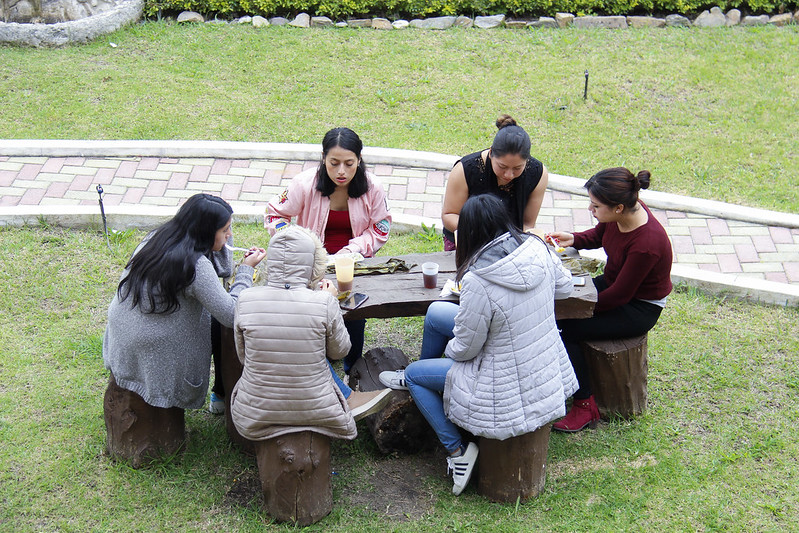
Relationship
Another essential aspect of incarnation is relationships. I love reading through the Gospels and watching Jesus relate to people. He had the unique ability to make everyone feel loved and important, and that became the bedrock of his influence and impact on those around him.
Early in my own ministry journey, I spent time with students at a local high school, getting to know them on their terms, often enough to hear, “Don’t you have friends your own age?” This time invested in relationship-building wasn’t just social—it was an intentional choice to earn trust and build genuine connections. This approach serves as a model for Kingdom ministry today: we are called to befriend our neighbors and in doing so are blessed to get to know our neighbors deeply. Instead of viewing them as “evangelistic targets” for ministry, or as “project beneficiaries” of our social outreach, we approach them as friends, brothers, and sisters. Establishing these kinds of relationships gives us credibility to speak meaningfully into people’s lives, enabling us to share our faith in ways that genuinely touch peoples’ hearts and souls. Moreover, these connections work both ways: as we build relationships, we ourselves are transformed through the love and care of our neighbors, learning from their resilience, insights, and experiences.
Solidarity
Living in the neighborhoods where we serve builds a profound sense of solidarity with our neighbors. As leaders like Dr. John Perkins, who was instrumental in founding the Christian Community Development Association in the United States, have emphasized, sharing in the day-to-day life of a community means that ‘their’ problems become ‘our’ problems as well. We’re no longer viewing issues like poverty, crime, education or lack of public spaces from the outside—they impact us directly. This solidarity with others is why the ministry of Jesus was so powerful. His compassion compelled him to share in the pain and struggles of those around him, allowing himself to be touched, and empathize with their anguish and suffering. Before he died for peoples’ sins, he entered people’s stories, fully aware of their struggles and burdens. Similarly, by living in solidarity with our neighbors, we practice one of the most essential aspects of Jesus’ approach, bringing authenticity to our work. While we may not be able to fix all the problems that we encounter in the neighborhoods we live in, this choice to stand alongside our neighbors—to feel their struggles as our own—reflects the heart of incarnational ministry. It embodies the relational empathy and commitment that make transformation possible.
Before he died for peoples’ sins, he entered people’s stories, fully aware of their struggles and burdens.
Humility
Philippians 2 beautifully reminds us that Christ came to us with great humility. Although he was God, with access to every privilege and power imaginable, he chose to strip himself of divine status and enter our world as a servant, even to the point of laying down his life. This humility is foundational to the incarnation, showing us that God’s approach to entering the world was marked by surrender rather than dominance. One of my concerns in encouraging people to adopt an incarnational approach to ministry is that well-meaning individuals might come in with a posture of fixing or saving rather than listening and learning. While it’s powerful to feel called to serve in vulnerable neighborhoods, truly impactful ministry requires deep humility in how we approach and engage with our neighbors. Effective ministry is not about showcasing our abilities, our connections, or our spiritual knowledge, but about approaching others with a spirit of humility and respect. The goal is not to impose solutions but to walk alongside others, respecting their experiences and wisdom. We must remember that our communities do not need us to “save” them but to join with them as humble participants in God’s work.
I’ll never forget attending the memorial service for one of our beloved leaders, Alan Tibbles, from New Song Urban Ministries in Baltimore. At the service, a young man Alan had mentored, Antoine, shared a tribute that captured the heart of incarnational leadership in a way I’ll always remember. Antoine stood up and introduced himself by saying, “I used to be an ex-con, but now I’m an i-con for Jesus.” That got everyone fired up. Antoine then shared the story of Alan’s arrival in the Sandtown neighborhood. Alan and his wife had felt a deep call to live and minister in Sandtown, a predominantly African American neighborhood, even though they were white. Shortly before moving in, however, Alan was in a tragic accident that left him paralyzed from the neck down. After years of recovery, Alan and Susan chose to proceed with their call and moved into Sandtown with Alan in a wheelchair. Antoine pointed out that if Alan had entered Sandtown as an able-bodied man full of confidence and ready to make change, his impact might have been limited. But his physical limitations and vulnerability brought a humility that resonated deeply with his neighbors, many of whom were all too familiar with pain and limitations.
This story reminds us that what communities truly need is our humble presence—willing to listen, learn, and build genuine relationships. It’s not our great abilities but our respect for the dignity of others and our openness to learn from them that makes an enduring impact, since humility fosters respect, dismantles prejudice, and opens doors for genuine transformation. Whether we are African American, White, Latino, Asian, Mestizo, Haitian, Indigene, Ladino, Mulatto, professionals, service workers, or any other background, we must never forget that humility must be our primary posture if we are to have any lasting impact that respects the dignity of our neighbors and reflects the humility of Jesus. For many, the idea of truly incarnating in our neighborhoods may seem radical, yet it’s simply following the example Jesus set when he entered the world through a humble Galilean neighborhood over 2,000 years ago. True Kingdom impact flows from this spirit of humility, which seeks to honor and serve the community as Christ himself would.
Proclamation and Formation
“Therefore, go and make disciples of all the nations, baptizing them in the name of the Father and the Son and the Holy Spirit. Teach these new disciples to obey all the commands I have given you. And be sure of this: I am with you always, even to the end of the age.”(Matthew 28:19-20, NLT)
The second expression of Kingdom ministry is the call to proclamation and formation, two elements that work hand-in-hand as one. Proclamation without formation misses the heart of discipleship, and formation without proclamation falls short of the Great Commission.
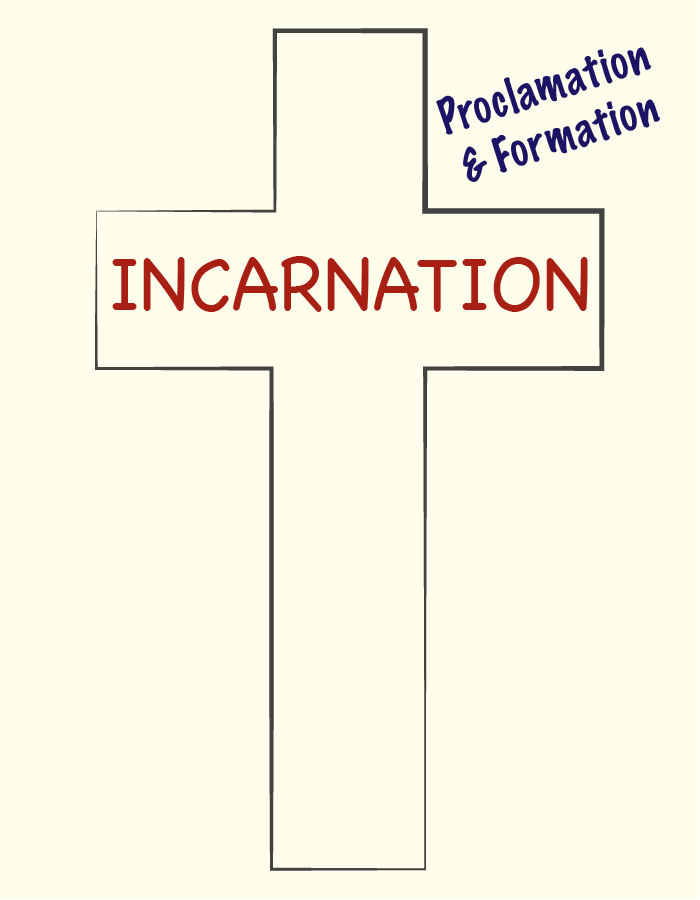
True discipleship, especially in challenging contexts, relies on being present with people, building trust, and helping people walk with Jesus in their everyday lives.
In most evangelical churches, you’ll often see the words of the Great Commission displayed prominently, underscoring our call and responsibility to bring the Good News of God’s love for a sinful world and spread it to the ends of the earth. Yet, while evangelism is deeply ingrained in evangelical identity, there’s a tendency to emphasize verbal proclamation at the expense of disciple formation or other Biblical expressions of Kingdom ministry. Matthew 28:19-20 makes it clear that our task isn’t simply to spread the gospel message but to make disciples—to teach and equip others to follow Christ’s teachings with a special focus on uplifting the poor and marginalized as central to our mission.
Unfortunately, this imbalance can lead to evangelistic efforts that prioritize numbers over depth. Often, well-meaning church groups conduct large-scale evangelism campaigns in struggling communities—sometimes with little to no personal relationship with the people or understanding of their context. These “drive-by” evangelism efforts, especially common in short-term mission trips to underserved areas, can inadvertently harm more than help. Local churches and leaders are sometimes unaware of these events happening right down the streets of their congregations, creating a disconnect that undermines trust and makes these efforts rather ineffective. While their intentions are genuine, and occasionally people are moved by hearing about God’s love, those hearing the proclamation may see a message preached but not lived out—a gospel proclaimed without any visible context or long-term engagement. The result is evangelism without incarnation, which can feel empty to those on the receiving end. Yet, proclamation without incarnation misses the heart of discipleship, and genuine formation without incarnation is nearly impossible. True discipleship, especially in challenging contexts, relies on being present with people, building trust, and helping people walk with Jesus in their everyday lives. This close proximity allows us to make disciples who are resilient, committed, and equipped to face the real struggles of their environment.
However, I’ve also observed that while many in the church focus solely on evangelism and verbal proclamation, some of those involved in community-based ministries who emphasize social concerns and social justice, have reacted by going to the opposite extreme. In their concern to avoid a “proclamation-only” approach, they sometimes overlook the need to verbally share the story of God’s love and the heart-transforming power of the Spirit. They too miss the opportunity to enflesh the message properly, because without verbal proclamation good works don’t necessarily point to the source of our hope and faith.
Ultimately, it is through long-term investment and forming disciples committed to sharing and living out their faith in their surroundings that transformation truly takes root. Both proclamation and formation are vital expressions of Kingdom ministry in the work of community transformation. Together, they bring people not only to faith but to a life of obedience to Jesus’ teachings, building a foundation for God’s Kingdom to flourish in our communities.
Demonstration of Compassion
“Pure and genuine religion in the sight of God the Father means caring for orphans and widows in their distress and refusing to let the world corrupt you.” (James 1:27 NLT)
Two of Jesus’ most powerful and poignant teachings on compassion are found in the parable of the Good Samaritan (Luke 10) and the teaching of the sheep and the goats (Matthew 25). Both passages urge us to understand true faith as inseparable from a deep concern for the poor and vulnerable. It seems every time the Gospel writers turn around, they reveal Jesus engaging with people who are suffering, needy, sick, dying, or oppressed. Jesus reminds us that our response to these individuals reflects our true understanding of God’s love and compassion and might be the clearest indicator of our faith’s authenticity.
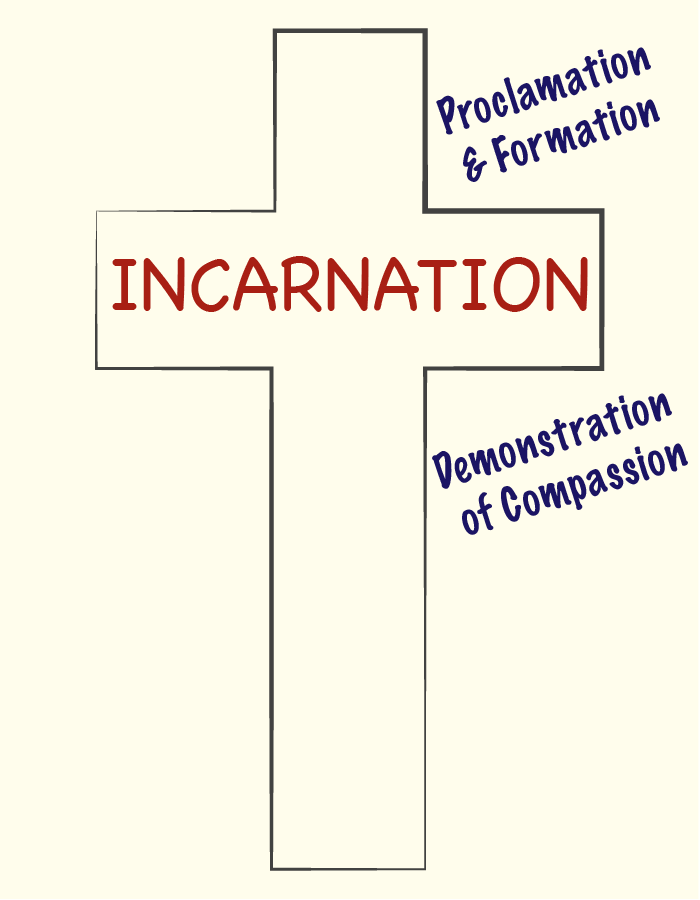
How can our acts of compassion move beyond immediate relief to foster sustainable change and transformation?
Today, it seems impossible to remain solely committed to verbal proclamation of the Gospel in contexts of deep need without also being equally committed to demonstrating compassion in tangible ways. The persistent existence of widespread need—despite immense wealth in certain sections of our countries and cities—should give us pause. In many urban centers, neighborhoods that are most neglected or devastated often are located in the shadows of unimaginable abundance and opulence. Furthermore, the fact that a disproportionate number of the poor in our nations are people of color or indigenous descent complicates even well-intentioned efforts, which can become marred by racial and cultural misunderstandings.
Bob Lupton, a lifelong board member of the Christian Community Development Association, presents a thought-provoking challenge in his book Toxic Charity. Lupton warns that, in our efforts to help the poor, especially from outside their communities, we risk creating ministries and programs that unintentionally harm the very people we aim to serve. Compassion without incarnation—without truly “being with” those we serve—can inadvertently objectify or disempower them. After years of observing the negative impact of this approach, many seasoned leaders are calling for a new paradigm of compassionate ministry—one that genuinely helps, rather than hurts, our neighbors.
Not long ago, I visited a food pantry that had recently undergone a beautiful renovation. At the end of the tour, the director proudly shared that some families had been receiving support from them for over 20 years. When I heard that, I had to ask if long-term dependence was the goal of their ministry. It created an uncomfortable and awkward pause, as it became clear this had not been considered. When compassion is rooted in incarnation, with the goal of individual and community empowerment, we can better discern when acts of compassion are a suitable response to crisis and when they risk creating dependency, becoming toxic acts of charity, that are causing long-term dependence in the lives of our neighbors. Compassionate ministry and acts of mercy rooted in the Kingdom are absolutely biblical but have limits. In fact, for those of us living in communities with acute needs, we constantly face decisions about how best to help, and we must ask ourselves, How can our acts of compassion move beyond immediate relief to foster sustainable change and transformation?
Restoration and Development
“To all who mourn in Israel, he will give a crown of beauty for ashes, a joyous blessing instead of mourning, festive praise instead of despair. In their righteousness, they will be like great oaks that the Lord has planted for his own glory. They will rebuild the ancient ruins, repairing cities destroyed long ago. They will revive them, though they have been deserted for many generations” (Isaiah 61:3-4 NLT).
“And work for the peace and prosperity of the city where I sent you into exile. Pray to the Lord for it, for its welfare will determine your welfare” (Jeremiah 29:7 NLT).
“I replied, ‘If it please the king, and if you are pleased with me, your servant, send me to Judah to rebuild the city where my ancestors are buried’” (Nehemiah 2:5 NLT).
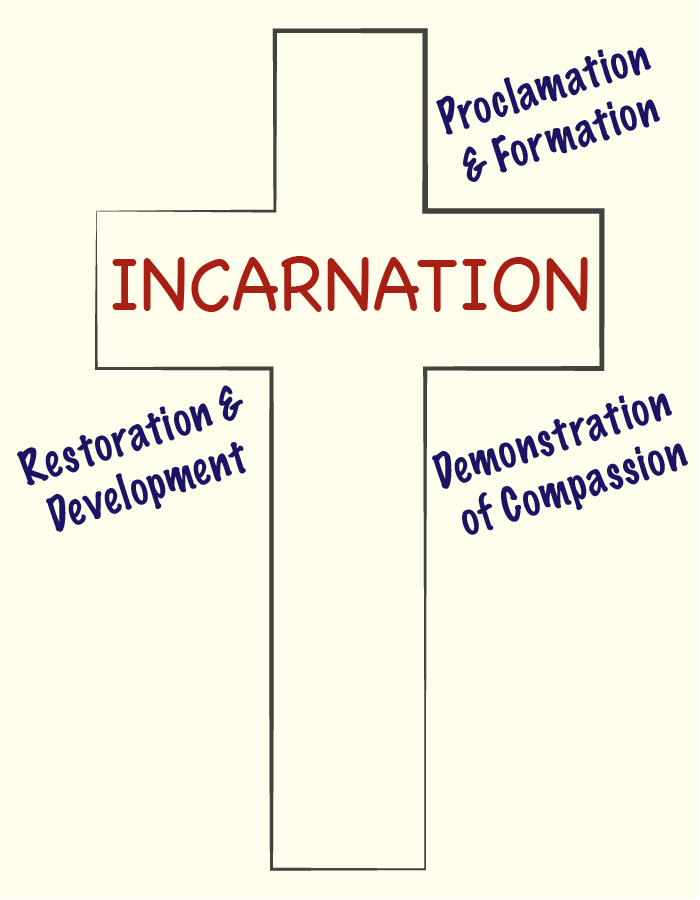
Restoration is not simply about rebuilding structures or launching programs, but about restoring hope, dignity, and a sense of belonging in neighborhoods often discarded by society.
In the context of Latin America and immigrant communities in the United States, the call to restoration and development takes on a pressing and transformative significance. Throughout history, many cities and neighborhoods in these regions have been scarred by inequality, violence, and neglect. The Word of God reminds us that just as He cares for individuals, He also cares deeply about neighborhoods, cities, and communities—especially those left in ruins by corruption, exploitation, or systemic neglect. This Kingdom vision challenges us to step into these places of desolation, embodying God’s concern for both people and the physical spaces they inhabit.
The early work of Dr. John Perkins and his wife Vera Mae in Mississippi, where they established the first Christian Community Development (CCD) ministry more than 50 years ago, continues to serve as a profound example. Dr. Perkins understood that authentic ministry could not be limited to preaching or charity but required active partnership with the community, empowering them with tools and resources to live dignified and productive lives. His vision of “redistribution” was not about government handouts but about connecting resources with local efforts to achieve justice and restoration, led by the church. This model is just as relevant today for marginalized neighborhoods across Latin America and for immigrant communities striving to flourish in often hostile environments.
Community and economic development have remained central to the Christian Community Development framework, recognizing that safe housing, access to decent jobs, quality education, and vibrant local churches are essential pillars for fostering healthy neighborhoods where families can thrive. However, one persistent challenge, particularly within evangelical circles, is the lack of a clear biblical theology that frames community restoration as a vital aspect of Kingdom ministry. Most Christians fully embrace the importance of proclamation and formation, and they are on board with demonstrating compassion, yet there is often hesitation to see rebuilding neighborhoods as integral to God’s mission.
I am so glad that in His wisdom, God included the book of Nehemiah for us to study and put into practice considering the devastating poverty and brokenness that exists in our world today. It provides a powerful model for Kingdom-centered restoration of an entire city. In the same way that God called Jeremiah and other prophets to speak truth to the people of Israel, or in the same way that He called Ezra the priest to rebuild the temple of Jerusalem, God called Nehemiah to the task of rebuilding the broken walls of that same city which was devastated and in ruins. Being obedient to God’s call, Nehemiah, an exiled Jewish leader and high-ranking government official living in Persia, returned to the city of his ancestors to pursue this calling. His mission was not simply about infrastructure but about restoring dignity, security, and the well-being of a devastated community. His partnership with Ezra, who focused on the spiritual renewal of the people, highlights the holistic nature of this work: both physical restoration (community development) and spiritual renewal (the rebuilding of the temple) were necessary for the community’s health and vitality.
In Latin America, where communities face extreme poverty, displacement, and systemic inequality, the vision of Nehemiah calls us to reimagine our priorities in ministry. Restoration is not merely about rebuilding structures or launching programs but about restoring hope, dignity, and a sense of belonging to neighborhoods often written off by society. For Latin American immigrants in the United States, this vision challenges us to be agents of transformation in neighborhoods that often grapple with cultural, economic, and social challenges.
The call to seek the “peace and prosperity of the city” in Jeremiah 29:7 and to “rebuild the ancient ruins” in Isaiah 61:4, therefore, underscores God’s concern for community restoration. Jesus’ Kingdom vision is not limited to individual salvation; it encompasses the renewal of entire neighborhoods and cities. In Latin America, this might mean addressing the needs of urban slums, neglected neighborhoods, or communities of migrants by working to improve housing, education, and economic opportunities.
Outside-In Development & the Complexity of the Task
It’s important that these community development efforts don’t happen from the outside, but in partnership with local leaders who pursue long-term strategies for restoration. The key to avoiding outside-driven solutions that perpetuate dependency, lies in following the model of Nehemiah—embracing a principle of incarnation that ensures restoration and development efforts are focused on creating thriving neighborhoods with and for the people of the community. Incarnation means entering the realities of those we serve, enabling initiatives that genuinely empower and uplift residents rather than marginalizing them further. In Latin America, this principle of incarnational ministry takes on profound significance. Whether serving in a neglected urban neighborhood in Lima or working among migrant communities in the U.S., Christians are called to move beyond charity. Incarnation involves living among the people, understanding their struggles firsthand, and partnering with them to co-create solutions. This could mean advocating for tenants’ rights in a barrio threatened by gentrification, creating community hubs, or championing local-led initiatives that address poor living conditions.
One of my favorite examples of restoration and development is what has been going on in the Lawndale neighborhood of Chicago through the ministries of Lawndale Christian Community Church. Not only is there a thriving church in the middle of the community for the residents of Lawndale, but there are ministries that address everything from health care to housing to legal services, all established out of the conviction that Christians ought to be engaged in the work of restoring our communities. Imagine what would happen if Christians all over the Western hemisphere would learn from the wisdom of the book of Nehemiah, with believers intentionally living among the people in struggling neighborhoods, building relationships and sharing life. As neighbors express interest in Jesus, disciples are made. Compassionate outreach becomes a natural extension of the church’s presence, and community listening mobilizes residents to work together to restore their neighborhood. Over time, a vibrant church emerges, with members actively engaged in ministry inside and beyond its walls. This would be a picture of success by most standards.
Incarnation means entering into the realities of those we serve, enabling initiatives that truly empower and uplift residents rather than further marginalizing them.
Now, it is important to acknowledge that the work of rebuilding neglected neighborhoods, whether in Latin America or immigrant communities in the U.S., is never a quick fix. It requires patience, commitment, and partnership. Many successful Christian Community Development (CCD) ministries emphasize that lasting change often takes 15 years or more of sustained effort. This process includes listening to the community, building trust, and empowering residents to take ownership of their development. The most important metric of success is faithfulness: being present as ambassadors of Christ and demonstrating God’s love through consistent, long-term engagement. Whether serving in a Brazilian favela, a rural Honduran village, or a Mexican immigrant neighborhood in Los Angeles, the task requires faithful presence and a commitment to justice and restoration. By living among those we serve and working alongside them, we embody the Good News of the Kingdom—not as outsiders imposing solutions but as co-laborers for transformation. Yet, even with all this, something critical would still be missing: the confrontation of injustice.
Confrontation of Injustice
“You trample the poor, stealing their grain through taxes and unfair rent. Therefore, though you build beautiful stone houses, you will never live in them. Though you plant lush vineyards, you will never drink wine from them. For I know the vast number of your sins and the depth of your rebellions. You oppress good people by taking bribes and deprive the poor of justice in the courts.” (Amos 5:11-12 NLT)
“Instead, I want to see a mighty flood of justice, an endless river of righteous living.” (Amos 5:24 NLT)
“The Spirit of the Lord is upon me, for he has anointed me to bring Good News to the poor. He has sent me to proclaim that captives will be released, that the blind will see, that the oppressed will be set free.” (Luke 4:18 NLT)
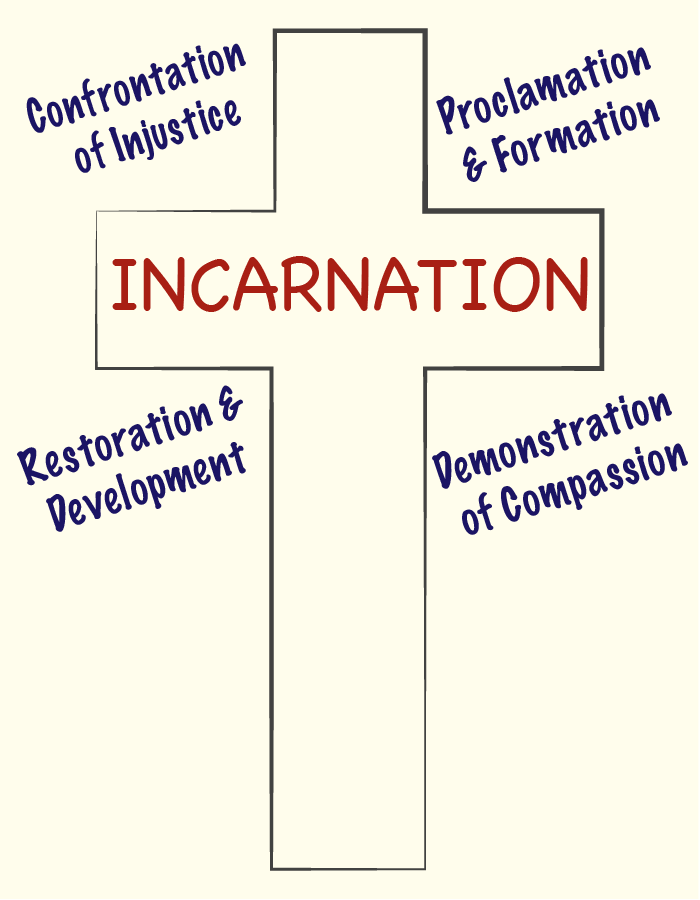
Confronting injustice at its roots is not optional but integral to the ministry of the Kingdom, demonstrating the transformative power of God’s justice and love.
In Latin America and among Latino immigrant communities, the confrontation of systemic injustice is an essential dimension of Kingdom ministry. While many recognize the personal nature of sin, it is often harder to see how institutions, systems, and structures can also be instruments of sin and evil. Yet Scripture teaches us that we battle not merely against flesh and blood but against powers and principalities of darkness that entrench sin and hinder human flourishing. Oppressive forces—beyond individual sin or personal failure—are at work, perpetuating poverty and hindering people from experiencing the abundant life. These systemic forces are especially evident in the struggles of marginalized communities, where poverty, corruption, and social exclusion perpetuate cycles of despair.
Throughout Latin America, historical legacies of colonialism, economic exploitation, and political corruption have created profound inequities, with many suffering deep-rooted poverty, lack of access to quality education, environmental degradation, and state violence. Indigenous and Afro-descendant communities continue to face systemic discrimination, and rural and urban poor areas confront not only physical neglect and under-investment, but also systemic exclusion from decision-making processes. Meanwhile, many who migrate to escape violence or economic instability encounter new forms of injustice, including exploitative labor practices, family separations, and broken immigration systems that keep millions of undocumented migrants in a state of vulnerability and fear. Recognizing these structural injustices allows us to see how the forces of sin operate not only on an individual level but also through entrenched systems that deprive people of justice and dignity. These realities showcase the need to not only “pull people out of the river” but to go upstream and confront the root causes of their suffering, for otherwise the full flourishing of a community will remain out of reach.
More than 30 years ago, I moved to La Villita, a predominantly Mexican American neighborhood in Chicago. As I walked alongside the community, I encountered the pervasive struggles of undocumented families. Many had risked their lives to seek better opportunities, yet they found themselves trapped by a legal system that criminalized their presence and denied them basic protections. As I sought ways to support them—through pastoral care, education, and job opportunities—it became evident that these efforts, while necessary, were not enough. Addressing their undocumented status and advocating for immigration reform became a critical Kingdom response.
This experience illustrates the importance of confronting systemic injustice as part of holistic ministry. Teaching Scripture or providing food aid, while essential, cannot fully address the structural barriers that oppress our neighbors. Advocacy for immigration reform became a natural extension of my work in La Villita, aligning with the biblical call to proclaim freedom for the oppressed and to work for systemic change. Today, I am encouraged to see a growing movement of Evangelicals embracing justice issues, recognizing they are deeply connected to God’s heart and not an optional add-on to Kingdom ministry.
Indeed, a growing awareness of God’s justice, as highlighted in the Bible, has inspired many in recent years to address these injustices. However, the sheer magnitude of global and local challenges—climate change, gender violence, human trafficking, corruption, and economic inequality—can overwhelm even the most compassionate hearts. In such times, it is crucial for individuals and ministries to focus on issues that most directly impact their local communities, ensuring their efforts are grounded, relevant, and actionable.
So, while some injustices demand national advocacy, much of the work happens locally. Whether addressing the disenfranchisement of Indigenous communities in Guatemala, gang violence in Brazil, or inequities in urban neighborhoods across Latin America and the U.S., the call remains the same: to proclaim Good News to the poor, to set the oppressed free, and to stand against forces that hinder human dignity and flourishing. Confronting injustice at its roots is not optional but integral to Kingdom ministry, demonstrating the transformative power of God’s justice and love.
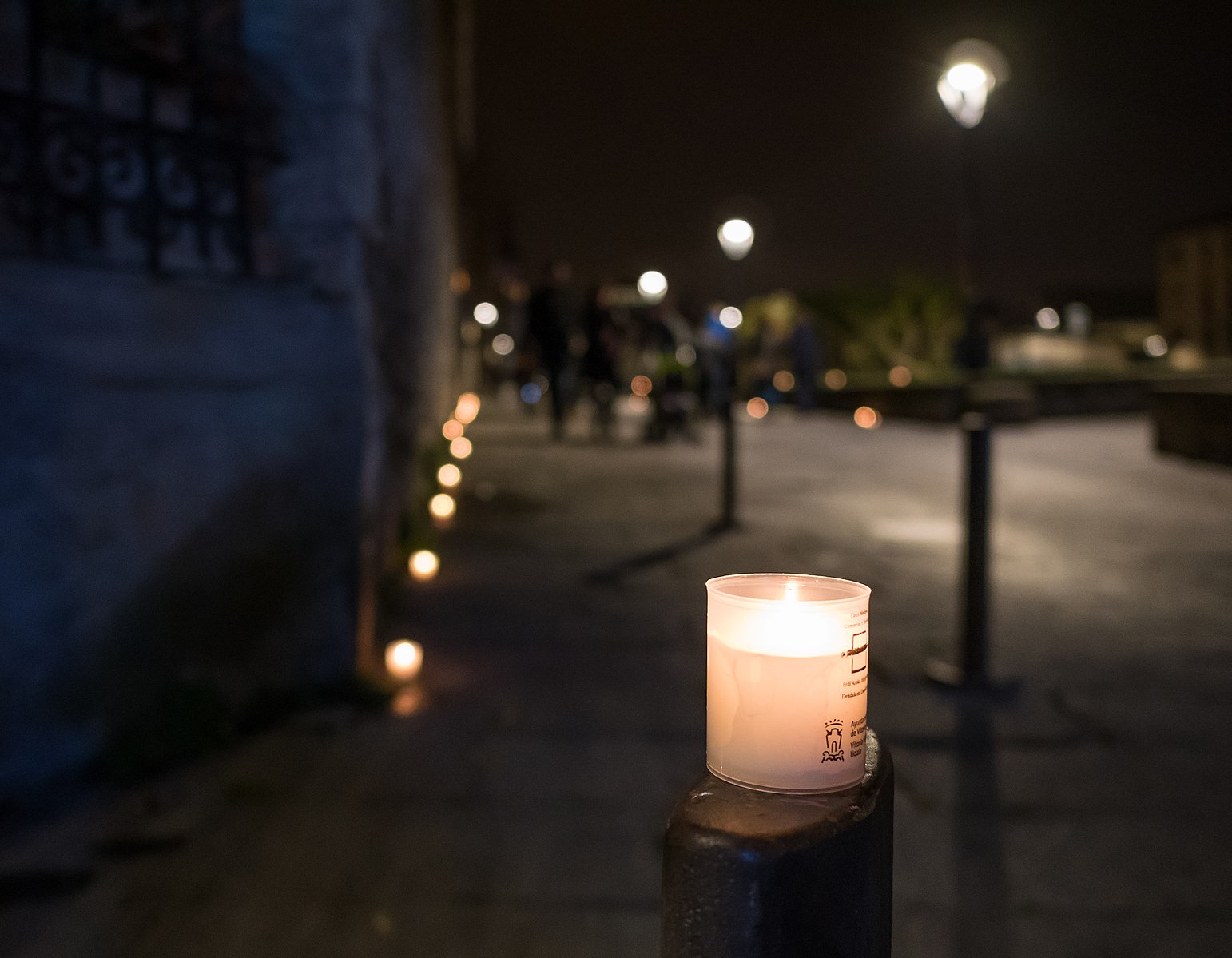
Conclusion: More Than Mumbo Jumbo
A while back, I was presenting this message at a century-old church. At the end of the teaching, I asked the congregation if anyone had questions or feedback. Immediately, a woman in the front row—who looked old enough to be one of the founding members—stood up and shouted, “This is mumbo-jumbo!” I acknowledged that what I had presented wasn’t a simplistic or easy answer to the question of poverty in our nation. I went on to say that many of us would love to believe that all it takes to transform our most devastated neighborhoods is for people to believe in Jesus. And while faith in Jesus would absolutely make an enormous difference in people’s lives, by itself it would not fix the broader issues impacting the neighborhoods they live in every day.
What I propose, is that being agents of the Good News of the Kingdom in our most vulnerable neighborhoods requires a holistic, Kingdom-driven approach. This work demands a commitment from Christians who are willing to engage deeply and sustainably, not at a distance, but from a posture of humility and incarnational living. It’s time to move beyond old paradigms that segment or reduce the work of the Kingdom. Like in the days of Nehemiah, we need pioneers who will answer God’s call to live in vulnerable communities—not necessarily to “fix” them but to be present as agents of God’s Kingdom. And for those who aren’t called to move into under-resourced areas, my prayer is that you partner with faithful practitioners of Christian Community Development (CCD) to bring about the shalom of God in struggling neighborhoods across Latin America.
The mission of Camino Alliance is to support local ministries and organizations in Latin America and among Latino Immigrants in the U.S. that address spiritual needs, urban poverty and migration to create thriving communities and cities rooted in Shalom. Through our work we seek to build alliances that unleash the power of faith, justice, collaboration, and generosity to help Latin Americans and Latino Immigrants to shape brighter futures in the communities where they live. We furthermore aim to cultivate a community of urban leaders committed to restoring under-resourced communities for the glory of God. We invite you to join this incredible movement of Christ-followers working to bring Kingdom impact to communities near and far.
In conclusion, a holistic approach to Kingdom ministry integrates all these aspects—incarnation, proximity, relationship, compassion, restoration, and justice. Each of these elements reflects a part of Jesus’ own ministry and challenges us to expand our understanding of the gospel. The Kingdom of God calls us to embody the Good News fully, not merely through words but through lives that reflect God’s justice, peace, and love in every community. To advance the Kingdom among the urban poor and marginalized communities in Latin America, we must adopt this integrated approach, entering our neighborhoods as agents of transformation, empowered by the Spirit to bring holistic change. Just as Jesus moved into the world with humility and love, we are invited to move into vulnerable spaces, sharing life with those who are often forgotten, and bringing the hope of God’s Kingdom where it is most needed.
Image Directory
- “Milagro de “Miracle of the Multiplication of the Loaves and Fishes,” Murillo. Public Domain.
- “Gathering with Accounting and Auditing Students”, UTPL. Flickr. CC BY-NC-SA 2.0
- “Vitoria – Night of Candles 2016, 02″, Basotxerri, Wikimedia. CC BY-NC-SA 4.0

